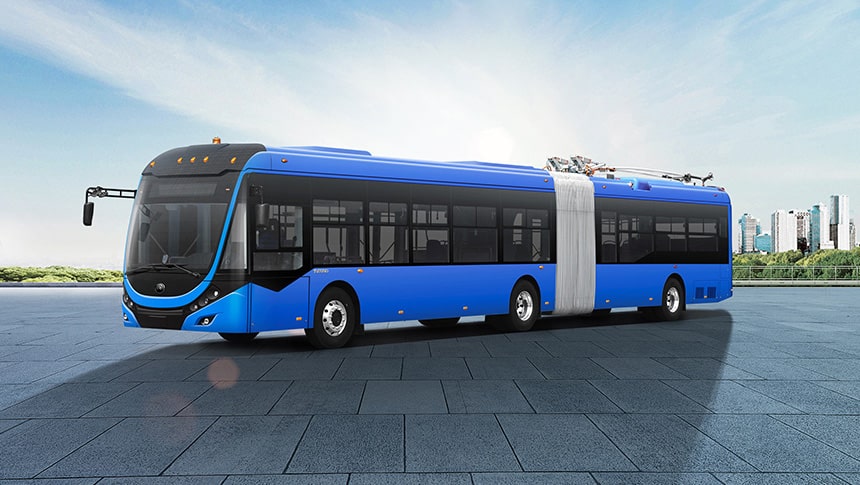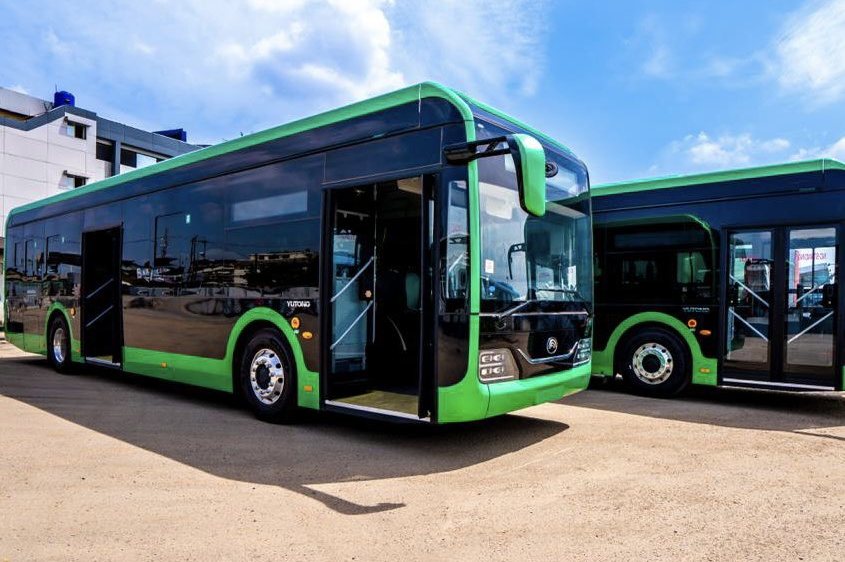Lagos, Nigeria’s bustling metropolis and one of the largest city in Africa by population, has put Electric Buses into testing mode to see whether they can withstand the city’s notorious traffics. Although, Electric Buses in Lagos is aimed at transitioning the Lagos State public transport system, but only for a select few, for now!
While contributing to the ongoing initiative of the five-year Climate Action Plan (CAP) 2020-2025, Oando Clean Energy Limited (OCEL), in partnership with the Lagos Metropolitan Area Transport Authority (LAMATA) to build a sustainable low carbon economy in the pursuit of achieving net zero emissions by 2050.
In other words, Lagos State is exploring brand new alternative like EVs to reduce Green House Gas (GHG) emissions. Transportation sector (such as BRTs and the iconic yellow Danfo buses) has contributed to over 62% of greenhouse gas emissions in the state.
However, the adoption of Electric Buses in Lagos will offer a viable, competitive, environmentally friendly and more comfortable way to move around in the city. Moreover, while the questions of whether the electric buses will break down in Lagos traffic might arise, keep in mind that;
The Lagos State Electric Mass Transit Buses can travel for up to 280 kilometres (Km) before requiring a charge. On a full charge, passengers can travel from Oshodi to Obalende—26.4km—to and fro approximately five times before the buses must be recharged.
Furthermore, Lagos has already put two electric buses in testing mode. These buses are traveling Oshodi to Obalende and Oshodi to Ikorodu routes. However, according to Kola Ojelabi, public relations officer for LAMATA, when Lagosians experience the launch of Electric Buses, the fare prices of the buses and the regular BRTs may the same.
Kola also cited in an answer given to TC report that the Lagos Electric Buses are still in “Proof Of Concept Phase”, which will determine whether the E-buses will replace BRTs in Lagos in the very near future. And whether the fare price be the same as BRT’s.
Benefits of Adopting Electric Buses in Lagos for Mass Transit
The Nigeria’s Inflation rate has seen a urge up to 22.27% this year because of the recent removal of fuel subsidies. Therefore, many average commuters have experienced difficulties getting public transport due to a hike in fare prices. But adopting EVs for Mass Transit could be an alternate solution to high fare price.
Furthermore, using electric buses as mass transit in Lagos State will offer a cheaper alternative as EVs are three (3) times more efficient and require minimal maintenance compared to regular fuel vehicles. Moreso, the buses will offer a viable, competitive, and environmentally friendly alternative to the current combustion engine vehicles available in the city.
The Electric Buses Ecosystem in Lagos will give average commuters the ability to meet their mobility needs, offering them a cheap, zero-carbon and efficient transportation system. Moreover, transportation has been major cause of pollutants and health problems in Lagos, so adopting EVs will enhance the ongoing initiatives in the energy sector to clean up the environment and achieve net zero emissions by 2050.
Furthermore, Transportation contribute to 62% of Nigeria’s GHG emissions. Meanwhile, adoption of Electric Vehicles (EVs) could revolutionize mobility in the country as well as build local capacity for the renewable and clean energy ecosystem. According to CEO at Oando Clean Energy Limited, Ainojie Irune said “Lagos Electric Buses have come from across the world, in the very near future they will be produced here in Nigeria.”
Human activities is also one the main drivers of climate change primarily due to the burning of fossil fuels like coal, oil, and gas. But with the introduction of Electric Vehicles (EVs) all these burning can be put to an end given rise to more viable and health-friendly environment. Lagos is the only state in Nigeria that has prepared and initiated the execution of a climate action plan.
Adoption of Electric Buses nationwide has been assumed to provide employment for over 30,000 Nigerians. Employment opportunities for people who can drive and locally trained engineers who are capable of operating, maintaining, and servicing these buses and other renewable energy assets.
In summary, Electric vehicles (EVs) have the potential to transform the transportation sector in Nigeria and offer a sustainable solution for the country’s growing population.
Possible Downside of Lagos Electric Buses
Although, Lagos Electric Buses hold great promise. But the poor maintenance culture in Nigeria poses a challenge. According to senior associate researcher at Cleantech Hub, Duncan Byencit said “if those buses are properly maintained by the drivers and whoever is in charge of it, they are very sustainable.”
However, in a statement made by the President/CEO of OCEL, Ainojie Irune, said “in the very near future, we will have a multitude of locally trained engineers who are capable of operating, maintaining, and servicing these buses and other renewable energy assets.”
Furthermore, to support the seamless running of the Lagos Electric Buses, the statement added that OCEL has invested and deployed charging stations in bus depots to ensure the buses are always fully charged. Moreso, extensive training has been offered to the drivers on the proper use and maintenance of the buses.
Lagos Traffics and Electric Buses
Electric Buses could help reduce the traffic congestion in Lagos roads and the carbon emission in the state. Most of the emission comes from small cars, so it will be good to divert to mass transit buses for transportation.
Because encouraging commuters to move to Electric Mass Transit Buses for transportation will not only reduce traffic but also reduce the emission that will be released by small cars in Lagos.
Conclusion
Adoption of Electric Buses (EBs) in Lagos is actively contributing to the development of a robust EV infrastructure ecosystem in Nigeria and further underscores the importance of public and private sector partnerships in achieving being a carbon-neutral Nation.
The Electric Buses is still in testing mode in Lagos State, followed by a pilot phase with an expanded fleet and bus routes, and it’s said to be rolled out starting with a three-month proof-of-concept phase, aimed at establishing the viability of electric vehicles for mass transportation in the state.
Lagos is one the most populous city in Africa, with a population of over 20 million people and growing. The city is the first City in Nigeria to adopt Electric vehicles, aimed at achieving its ambition of commitment to net zero by 2050.


